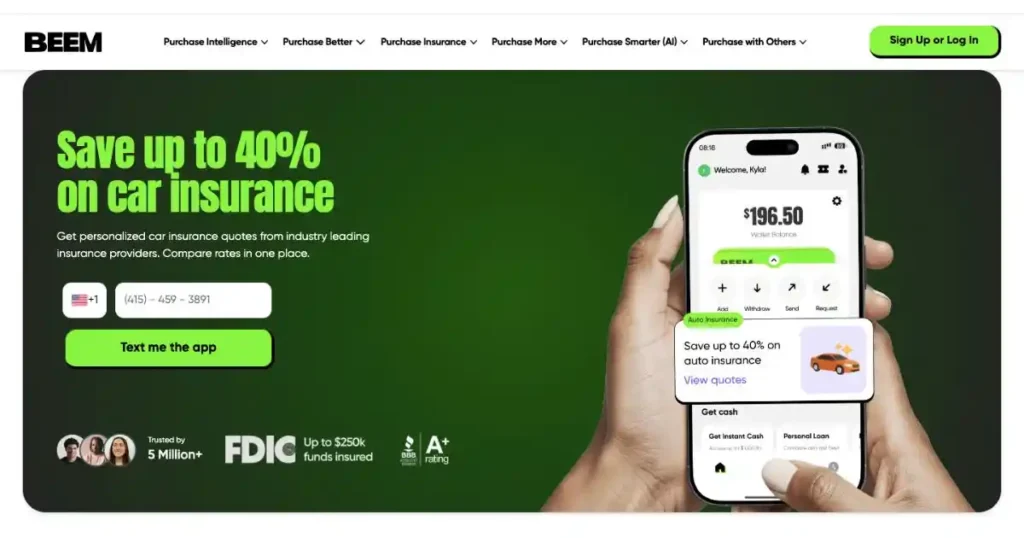“What if your insurance bill went down because you’re a good driver? Is usage-based car insurance right for you?”
It sounds too good to be true, but usage-based auto insurance (UBI) offers safe, low-mileage drivers an opportunity to save on their premiums for doing what they already do best.
Indeed, this new model has been picking up steam as a wise alternative to conventional auto insurance. Rather than basing your rate on general categories such as age, location, or credit score, UBI considers your actual driving behavior.
But is it the best choice for you? That will consider several factors, including your driving habits and insurance expenses. In this blog, we will dissect all there is to know about usage-based car insurance, from what it is and how it works to who gains the most and how to compare UBI plans with Beem to help you decide quickly.
What Is Usage-Based Car Insurance?
UBI Defined in Simple Terms
Usage-based insurance (UBI) is an alternative pricing model that realistically evaluates your driving patterns. Using either a mobile app, a plug-in device that connects to your car, or a built-in telematics system in your vehicle, UBI programs track and monitor your behavior behind the wheel.
What’s tracked?
- How far do you drive
- When you drive (time of day and frequency)
- How you drive (speeding, braking, acceleration, and use of technology while driving)
Essentially, UBI helps insurers assess the actual risk you pose on the road—based on how you drive, not just broad demographics like age, gender, or even your ZIP code. The idea is simple: if you’re a safe, low-mileage driver, you should pay less for coverage.
Common UBI Models
Not all UBI programs are created equal. Here are the most common models to look out for:
- Pay-How-You-Drive (PHYD): This model bases your premium on driving behavior. It could cost you more if you drive aggressively—hard braking, speeding, or frequent acceleration. Safe drivers who avoid risky behaviors are rewarded with discounts.
- Pay-As-You-Drive (PAYD): This model focuses primarily on your mileage. Driving fewer miles per year means you’re considered less of a risk; your premium reflects that. This is perfect for people who don’t use their car as much, such as remote workers or those with short commutes.
- Real-Time Feedback and Driving Scores: Some UBI programs provide real-time feedback through an app or on-device display. Based on your driving, you’ll get scores or ratings, and you can adjust your behavior to improve your rating over time, which can lead to further savings.
Each UBI model has its own set of benefits, so the one that suits you best depends on how you drive and what features you’re looking for in a policy.
Read related blogs: Teen Drivers and Car Insurance: How to Save Without Skimping on Coverage
Why Is Usage-Based Insurance Gaining Popularity?
More Personalized Pricing
Traditional auto insurance pricing is typically based on broad categories. For example, a 22-year-old male living in a high-traffic urban area will likely pay more than a 40-year-old woman in a rural setting. These categories are generalizations that can often feel like a one-size-fits-all approach.
UBI, on the other hand, offers personalized premiums based on your actual behavior and driving patterns. UBI allows insurers to tailor your premiums to match your low-risk profile if you’re a safe driver who doesn’t speed, brake harshly, or drive many miles. That’s a massive benefit for those penalized under traditional insurance pricing due to their demographic information alone.
Potential for Big Savings
One of the biggest attractions of UBI is its potential for savings. If you’re a safe driver who logs relatively few miles, you could see savings of 10–30% or more on your premium, depending on the insurer and program.
For example:
- Low-Mileage Drivers: If you only drive a few thousand miles each year, UBI programs can reward you with lower rates because you’re less likely to be involved in an accident simply due to the limited time you spend on the road.
- Safe Drivers: If you’re a cautious driver—maintaining speed limits, avoiding rapid acceleration or hard braking—you can benefit from premium reductions. Insurers will see you as a low-risk driver and, in turn, offer you lower premiums.
- Younger Drivers or First-Time Car Owners: New drivers often face high insurance premiums because of their lack of driving history. UBI offers a way to demonstrate safe driving over time and get rewarded with lower rates, which could lead to long-term savings.
Who Should Consider Usage-Based Insurance?
Low-Mileage Drivers
Are you someone who drives petite each year? If so, usage-based car insurance could be a game-changer for you. People who work from home, are retired or have short commutes may not put many miles on their vehicles. UBI allows these drivers to pay based on their driving rather than being forced into a generic pricing model that doesn’t reflect their lower risk.
For example, if you drive less than 5,000 miles annually, traditional insurance companies might still charge you the same premium as someone who drives twice as much simply because your profile says you’re a higher risk. With UBI, your actual driving habits—mileage included—are considered, which can lower your rate significantly.
Safe Drivers
Do you pride yourself on being a cautious, thoughtful driver? If you regularly follow speed limits, avoid distractions, and steer clear of aggressive driving, you might qualify for UBI discounts. UBI programs that reward safe driving behavior can be a great option, as they offer premium reductions for people who maintain a clean driving record.
By monitoring how often you brake hard or how quickly you accelerate, UBI plans can show insurers that you pose less risk on the road. If you’re careful with your driving habits, why not get rewarded?
Younger or First-Time Drivers
Insurance for younger drivers is often unreasonably high, especially if you don’t have much driving history. UBI can help first-time drivers prove their safe driving habits early on, which can reduce their premiums in the long run.
For example, new drivers often get penalized for being “young and inexperienced.” Still, if they can show their driving patterns through a UBI program, they could be rewarded for responsible driving even before they build a long history.
Read related blogs: Can Paying Car Insurance Monthly Hurt Your Finances
When Does Usage-Based Insurance Make the Most Sense?
During a Lifestyle or Routine Change
Are you making a significant life change that impacts your driving habits? UBI might be just what you need. Here are a few scenarios when UBI makes perfect sense:
- Switching to remote work: Your mileage will drop dramatically if you’re no longer commuting to an office daily. Traditional auto insurance might not adjust to this change in driving habits, but UBI can offer a more dynamic solution.
- Driving less post-pandemic: Many people drove less due to remote work or lifestyle changes during the pandemic. If your driving has decreased significantly, UBI could reflect that and result in lower premiums.
- Buying a second vehicle: If you’re adding a vehicle that’s not driven frequently, UBI can offer a flexible policy that aligns with your new driving patterns.
When Traditional Rates Are Too High
UBI could be a viable alternative if you’re currently paying high premiums due to factors like age, location, or even your driving history. For instance, young drivers or people living in urban areas with high accident rates often face higher insurance premiums under traditional pricing models. UBI offers a more customized solution, ensuring that only your driving habits are being evaluated, not your demographic.
Where Can You Find the Best Usage-Based Programs?
Compare Providers via Beem
There’s no shortage of UBI insurers, but not all are equal. Some programs offer greater discounts based on your driving habits, while others may have limitations in coverage or technology. It’s essential to do your research and compare providers.
That’s where Beem comes in. With Beem, you can compare traditional vs. UBI quotes to find the best deal for your unique driving profile. Beem makes the comparison process easy, transparent, and tailored to your needs so you can quickly identify whether UBI is the right option.
Regional & National Variations
UBI isn’t available in all states or through all insurance providers, so check what’s offered in your region. Also, the discounts and features offered can vary depending on your location. Using a platform like Beem, you can get a clear sense of what’s available in your area and choose the provider that best matches your needs.
How to Decide? – Is Usage-Based Car Insurance Right
Step 1: Evaluate Your Driving Habits
Do you primarily drive short distances? Are you cautious and avoid risky behaviors like speeding or distracted driving? If so, UBI could be an excellent fit for you. Use Beem to check how much you could save based on your unique driving profile.
Step 2: Try a Trial Program
Many insurers offer trial periods where you can test the UBI program before fully committing. This lets you see if the savings are worth it and whether the program works with your driving habits.
Step 3: Compare UBI vs Traditional Policies
Beem allows you to easily compare UBI vs traditional policies based on your driving history and habits. This will help you determine if UBI truly offers the savings you’re looking for.
Step 4: Understand Privacy Trade-Offs
Remember that UBI relies on tracking your driving data, which could raise privacy concerns. It is essential to understand what data is being collected, how it’s used, and whether you’re comfortable sharing that information. Be transparent with insurers about your preferences, and ensure you’re comfortable with their privacy policies before committing.
Final Thoughts – Drive Smart, Save Smart
Usage-based insurance is a win-win for many drivers. If you’re a cautious driver who doesn’t log many miles, UBI offers a way to save money while keeping the same level of coverage. By rewarding safe and low-mileage driving, UBI provides a customized approach that makes sense for the modern driver.
If you already follow good driving habits, there’s no reason you shouldn’t be rewarded for it. And with tools like Beem, comparing UBI options has never been easier. Curious What You Could Save with Usage-Based Insurance? Compare usage-based and traditional auto insurance quotes with Beem in just minutes.















































